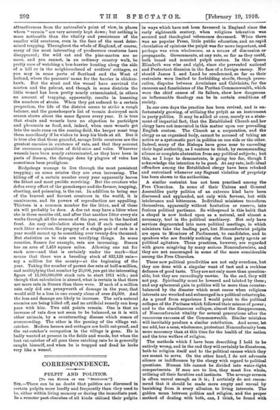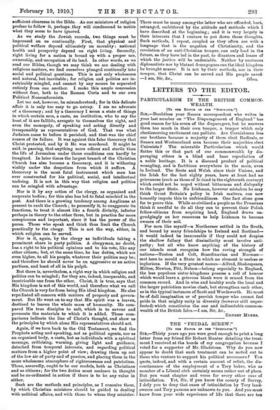CORRESPONDENCE.
PULPIT AND POLITICS.
[TO THE EDITOR OP Pas " SPECTATOR.") SIR,—There can be no doubt that politics are discussed in certain pulpits more loudly and frequently than they used to be, either within living memory or daring the immediate past. In a remoter past churches of all kinds utilised. their pulpits in ways which have not been favoured in England since the early eighteenth century, when religious toleration was secured and theological vehemence decreased. When there was no popular Press, little public education, and no rapid circulation of opinions the pulpit was far more important, and perhaps was even wholesome, as a means of discussion or propaganda. Governments, at any rate, so far as they could, both tuned and muzzled pulpit orators. In this Queen Elizabeth was wise and right, since she prevented national and Protestant disunion in the face of a foreign enemy. Nor should James I. and Laud be condemned, so far as their restraints were limited to forbidding sterile, though provo- cative, disputes between Arminians and Calvinists, for the excesses and fanaticisms of the Puritan Commonwealth, which were the chief causes of its failure, show how dangerous an inflammable theology can be in certain conditions of society.
In our own days the practice has been revived, and is un- fortunately growing, of utilising the pulpit as an instrument in party politics. It may be added at once, merely as a state- ment of impartial fact, that the Established Church and her clergy have not innovated in this matter upon our prevailing English custom. The Church as a corporation, and the clergy as an organised body, cannot be accused of taking an active or a systematic part in politics on one side or the other. Indeed, many of the Bishops have gone near to exceeding their legal authority, as I venture to think, by recommending silence or complete abstention from any political subjects; but this, as I hope to demonstrate, is going too far, though I acknowledge the intention to be good. At any rate, indir idual offenders among the Established clergy have been rebuked and restrained whenever any flagrant violation of propriety has been shown to the authorities.
A similar restraint has not been practised among the Free Churches. In some of their Unions and General Assemblies party politics of an extreme kind have been discussed and applauded, not only with fervour, but with intolerance and bitterness. Individual ministers transform themselves, apparently without hesitation or reserve, into furious political partisans. So widespread is this habit that a chapel is now looked upon as a natural, and almost a necessary, tool in the political machinery. Not only have services degenerated into mere political meetings, in which ministers take the leading part, but Nonconformist pulpits are open to Members of Parliament, to candidates, and to speakers who are frankly nothing else than party agents or political agitators. These practices, however, are regarded with grave misgiving by many serious Nonconformists, and they are not encouraged in some of the more considerable among the Free Churches.
These new political proclivities are not only overdone, but they are done with a singular want of tact and a reckless defiance of good taste. They are not only more than question- able, but they are exceedingly unwise. In the end, they will not pay. Spirituality must be lowered and tainted by them; and any ephemeral gain in politics will be more than counter- balanced by the disaster which must ensue when religious interests are wrecked and submerged in a political catastrophe. As a proof from experience I would point to the political collapse of the Puritans which followed their misuse of power ; and to the simultaneous collapse, almost the disappearance, of Nonconformist vitality for several generations after the rancorous excesses of the Commonwealth. Similar mistakes will inevitably produce a similar retribution. And never, let me add, has a sane, wholesome, protestant Nonconformity been more necessary than at this time for the health of the nation and the true welfare of religion.
The methods which I have been describing I hold to be entirely wrong, and in the end they will certainly be disastrous, both to religion itself and to the political causes which they are meant to serve. On the other hand, I do not advocate silence or indifference by the clergy with regard to political questions. Human life cannot be divided into water-tight compartments. If men are to live, they must live whole, utilising all their faculties and instincts. The average sermon is often unreal enough as it is ; I certainly do not recom- mend that it should be made more empty and unreal by banishing from it every allusion to living interests. The golden mean between politics and religion, and the proper method of dealing with both, can, I think, be found with
sufficient clearness in the Bible. As our ministers of religion profess to follow it, perhaps . they will condescend to"notice what they seem to have ignored.
As we study the Jewish records, two things must be impressed on us continually. First, that physical and political welfare depend ultimately on morality : national health and prosperity depend on right living. Secondly, right living for a nation is bound up with a proper use, ownership, and occupation of its land. In other words, as we read our Bibles, though we may think we are dealing with religious matters, we find ourselves plunged continually into social and political questions. This is not only wholesome and natural, but inevitable ; for religion and politics are in- extricably mingled, and cannot by any means be separated entirely from one another. I make this ample concession without fear, both to the Roman Curia and to our own Political Nonconformists.
Let me not, however, be misunderstood; for in this delicate affair it is only too easy to go astray. I am no advocate of a theocracy; and by a theocracy I mean a state of things in which certain men, a caste, an institution, who to say the least of it are fallible, arrogate to themselves the right, and even the monopoly, of speaking and acting directly and irresponsibly as representatives of God. That was what Judaism came to before it perished, and that was the chief reason of its failure. It was against this false theocracy that Christ protested, and by it He was murdered. It might be said, in passing, that anything more ()loud and sterile than the life of Jerusalem under those conditions can hardly be imagined. In later times the largest branch of the Christian Church has also become a theocracy, and it is withering visibly under the despotism from which it suffers. A theocracy is the most fatal instrument which man has ever constructed for his political, social, and intellectual undoing. It is not in this way that religion and politics can be mingled with advantage.
Nor is it by any action of the clergy, as organised and corporate bodies ; for this also has led to fatal mischief in the past. And there is a growing tendency among Anglicans at present to exalt the Church ; to personify it, to exaggerate its functions, to treat it almost like a fourth divinity, inferior perhaps in theory to the other three, but in practice far more conspicuous and important, since it has the power of the purse. Those who speak and think thus limit the Church practically to the clergy. This is not the way, either, in which religion can be served.
Nor is it, again, by the clergy as individuals taking a prominent share in party politics. A clergyman, no doubt, has a right to his political opinions and to his vote, like any other citizen; but at the same time, he has duties, which are even higher, to all his people, whatever their politics may be; and therefore he should never be an aggressive or an active partisan, and least of all in his pulpit.
But there is, nevertheless, a right way in which religion and politics can be mingled ; for they are, indeed, inseparable, and inextricable one from the other. Christ, it is true, says that His kingdom is not of this world, and therefore what we call the Church is very far from being His ideal kingdom. He also repudiated all concern with matters of property and govern- ment. But He went on to say that His spirit was a leaven, destined to leaven the whole mass of humanity. He com- pared His true disciples to salt, which is to savour and permeate the materials to which it is added. These com- parisons indicate the line of Christ's thought, and show us the principles by which alone His representatives should act.
Again, if we turn back to the Old Testament, we find the Prophets acting and speaking, not as political agents, nor as an organised body, a caste, but as individuals with a spiritual message, criticising, warning, giving light and guidance, detached from temporal interests, and regarding political matters from a higher point of view; drawing them up out of the low air of party and of passion, and placing them in the more wholesome atmosphere of righteousness and patriotism. These, assuredly, ought to be our models, both as Christians and as citizens; for the two duties must coalesce in thought and be co-ordinated in action if there is to be any value in either.
Such are the methods and principles, as I conceive them, by which Christian ministers should be guided in dealing with political affairs, and with those to whom they minister. There mist be many among,•the latter who are offended, hurt, estranged, embittered by the attitude and methods which I have described at the beginning ; and it is very largely in their interests that I venture to put down these thoughts. Such methods, I repeat, coupled as they often are with a language that is the negation of Christianity, and the revelation of an anti-Christian temper, can only lead in the future, as they have led in the past, to disasters and losses of which the justice will be undeniable. Neither by unctuous diplomatists nor by blatant demagogues can the ideal kingdom be brought nearer. It is not by their methods, nor in their temper, that Christ can be served and His people saved.









































 Previous page
Previous page